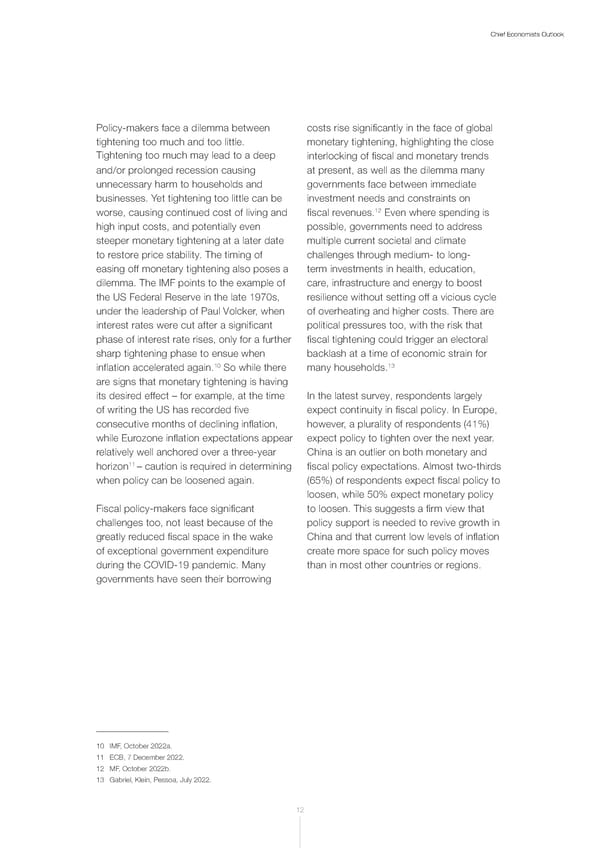12 Chief Economists Outlook Policy-makers face a dilemma betw een tightening too muc h and too little. Tightening too m uch may lead to a deep and/or prolonged re cession causing unnecessary harm to households and businesses. Yet ti ghtening too little can be worse, causing co ntinued cost of livi ng and high input costs, and potentially even steeper monetary tightening at a la ter date to restore pric e stability. The t imi ng of easing off moneta ry tightening also p oses a dilemma. The IM F points to the ex ample of the US Federal R eserve in the lat e 1970s, under the leaders hip of Paul Volcke r, w hen interest rates w ere cut after a significant phase of interest rate rises, only for a further sharp tightening pha se to ensue when inflation accele rated again. 10 So while there are signs that m onetary tightening is having its desired effect – for example, at the time of writing the US has recorded fiv e consecutive mont hs of declining in flation, while Eurozone inflation expect ations appear relatively well anchored over a t hree-year horizon 11 – caution is req uired in determi ning when policy can be loosened agai n. Fiscal policy-make rs face signific ant challenges too, not least because of the greatly reduced fiscal space in the wake of exceptional g overnment expenditure during the COVID- 19 pandemic. M any governments have se en their borrow ing costs rise significantly in the face of global monetary tightening, highlighting the close interlocking of fiscal and monetary trends at present, as well as the dilemma many governments face between immediate investment needs and constraints on fiscal revenues. 12 Even where spending is possible, governments need to address multiple current societal and climate challenges through medium- to long- term investments in health, education, care, infrastructure and energy to boost resilience without setting off a vicious cycle of overheating and higher costs. There are political pressures too, with the risk that fiscal tightening could trigger an electoral backlash at a time of economic strain for many households. 13 In the latest survey, respondents largely expect continuity in fiscal policy. In Europe, however, a plurality of respondents (41%) expect policy to tighten over the next year. China is an outlier on both monetary and fiscal policy expectations. Almost two-thirds (65%) of respondents expect fiscal policy to loosen, while 50% expect monetary policy to loosen. This suggests a firm view that policy support is needed to revive growth in China and that current low levels of inflation create more space for such policy moves than in most other countries or regions. 10 IMF , October 2022a. 11 ECB, 7 December 2022. 12 MF , October 2022b. 13 Gabriel, Klein, Pessoa, July 2022.
 WEF Chief Economists Outlook 2023 Page 11 Page 13
WEF Chief Economists Outlook 2023 Page 11 Page 13